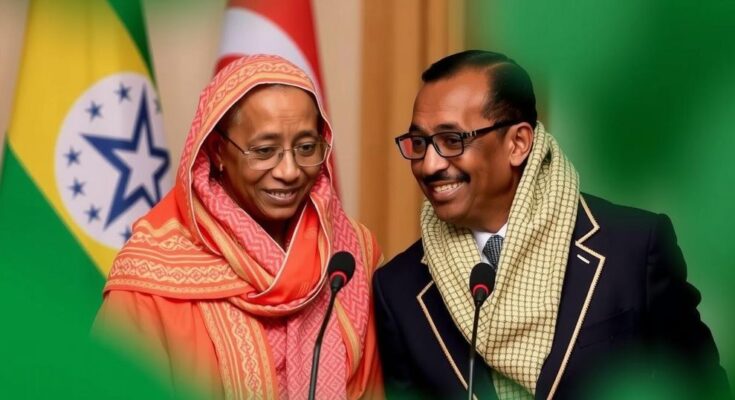Somaliland asserts that its Memorandum of Understanding with Ethiopia is still valid amid recent agreements between Somalia and Ethiopia, brokered by Turkey. Somaliland emphasizes its independence and commitment to pursuing its bilateral agreements, despite heightened tensions between Somalia and Ethiopia.
A representative from Somaliland has reaffirmed that their existing Memorandum of Understanding (MoU) with Ethiopia remains valid despite recent developments stemming from an agreement between Somalia and Ethiopia. Following mediation efforts by Turkish President Recep Tayyip Erdogan, Ethiopia has sought a coastal access arrangement that has been met with resistance from Somalia, which considers the agreement “null and void.”
Somaliland’s official, Abdulahi Mohammud, emphasized that the diplomatic relations between Somalia and Ethiopia are a matter exclusive to those nations, asserting, “Any country that tries to interfere in our internal affairs with regards to [the] case of Somalia vis a vis Ethiopia, that are two different issues that concern the two countries, not us.”
Tensions have escalated, leading to Somalia’s expulsion of several Ethiopian diplomats and attempts to limit Ethiopia’s involvement in the African Union Transition Mission in Somalia (ATMIS). The Ankara Declaration aims to grant Ethiopia access to the sea under Somali jurisdiction while respecting Somalia’s sovereignty. Technical negotiations are scheduled for February 2025 with the expectation of finding mutual agreement, although analysts suggest this may alter or negate Somaliland’s prior MoU.
Abdurahman Seid, a political analyst, noted that the Ankara Declaration’s wording signals that the past agreements may no longer hold significance, with Ethiopia recognizing Somalia’s sovereignty as a pivotal requirement for future arrangements. In light of recent political changes in Somaliland, where Abdirahman Mohamed Abdullahi has taken office, the focus remains on securing international recognition and advancing the agreement with Ethiopia.
The new leadership maintains that the bilateral agreement with Ethiopia stands firm, separate from Somalia’s dealings with Ethiopia. Abdullahi reiterates, “We have a binding MoU and we are pursuing it.”
With political dynamics shifting in the Horn of Africa, the relationship between Somaliland and Ethiopia will require careful navigation to ensure adherence to established agreements and recognition of regional sovereignty.
This article discusses the ongoing diplomatic complexities in the Horn of Africa, focusing on the relationship between Somaliland and Ethiopia amidst the recently established agreement between Somalia and Ethiopia. Somaliland, having declared independence from Somalia, perceives its MoU with Ethiopia as a crucial element of its sovereignty and seeks to maintain that relationship irrespective of Somalia’s stance. At the same time, the evolving diplomatic landscape, influenced by external factors such as the Turkish mediation, complicates these relationships as various actors pursue their national interests and recognition on the international stage.
In conclusion, Somaliland’s commitment to its Memorandum of Understanding with Ethiopia underscores its aspirations for sovereignty and international recognition despite the tumultuous political backdrop and Somalia’s recent diplomatic maneuvers. As Somaliland navigates the shifting political landscape while affirming its agreements, the outcomes of upcoming negotiations and Ethiopia’s relations with Somalia will significantly impact regional stability and Somaliland’s future.
Original Source: www.garoweonline.com




